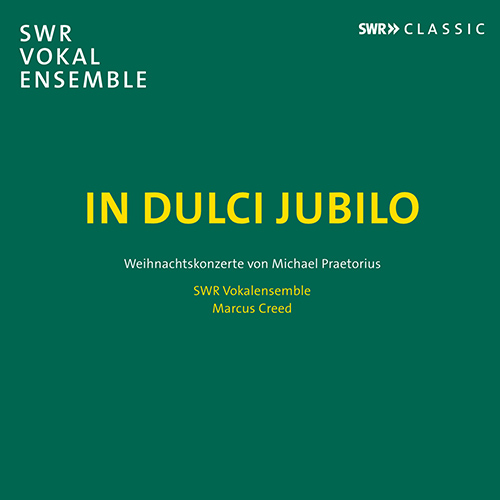PRAETORIUS, M.: Christmas Choral Works (In dulci jubilo) (South West German Radio Vocal Ensemble, M. Creed)
Tracklist
Luther, Martin - Lyricist
Creed, Marcus (Conductor)
Creed, Marcus (Conductor)
Creed, Marcus (Conductor)
Creed, Marcus (Conductor)
Nicolai, Philipp - Lyricist
Creed, Marcus (Conductor)
Creed, Marcus (Conductor)
Creed, Marcus (Conductor)
Creed, Marcus (Conductor)
Creed, Marcus (Conductor)
Creed, Marcus (Conductor)
Luther, Martin - Lyricist
Creed, Marcus (Conductor)
Creed, Marcus (Conductor)
Creed, Marcus (Conductor)
Creed, Marcus (Conductor)
The radio choir of SWR is one of the international top ensembles on the professional choir scene. Ever since the ensemble was founded almost 75 years ago it has devoted its passion and extraordinary vocal competence to exemplary performances and the further development of vocal music.
The instrumental tonal culture and the vocal and stylistic flexibility of the singers are unique and do not only fascinate the audiences in international concert halls, but also the composers. More than 250 works were written for the SWR Vokalensemble over the past decades and new ones are added every year. In addition to contemporary music the SWR Vokalensemble specifically focusses on the demanding choral works of the Romantic and classical modern period.
From 2004 to 2020 Marcus Creed was the chief conductor of the SWR Vokalensemble. Under his direction the ensemble was awarded numerous prizes for its chamber music culture of interpretation and its stylistic confidence: the “Deutsche Schallplattenkritik” Annual Award, the “Echo Klassik”, the “Diapason d’Or”, the “Choc de la Musique” and the “Grand Prix du Disque” to name but a few. Since 2020 Yuval Weinberg has been the ensemble’s artistic director. With the recording of the complete choral works by György Ligeti, released in 2023, he presented his first recording as chief conductor of the SWR Vokalensemble.
In the 1590s Michael Praetorius settled in Wolfenbüttel as organist to Duke Heinrich Julius of Brunswick Wolfenbüttel and was later appointed court Kapellmeister. In 1613 he moved temporarily to Dresden, at the request of the Elector of Saxony, returning to Wolfenbüttel in 1616 although continuing to undertake other work, not least in the reorganisation of musical establishments. His writings on music include the important Syntagma musicum, the second volume of which gives useful information on the musical instruments of his time.
Church Music
Descended from a family of strict Lutheran persuasion, Praetorius based a great deal of his music on Lutheran hymns and on the Latin Lutheran liturgy of the time. His Musae Sioniae, in nine parts, contains a variety of Lutheran church music, polyphonic and homophonic. It contains a number of works which have become a moderately familiar part of today’s choral and hymn repertoire, in particular the familiar carol Es ist ein Ros entsprungen (‘A Rose has Grown’), In dulci jubilo and Puer natus in Bethlehem (‘A Boy is born in Bethlehem’).
Instrumental Music
Instrumental music by Michael Praetorius is confined to his collection of dances, Terpsichore. A set of organ chorales is included in the seventh book of Musae Sioniae.































